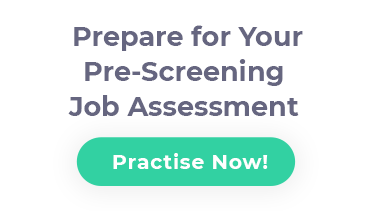ADIA Aptitude Tests, Assessment Centre & Interview Process Online Preparation – 2025

What Is ADIA?
ADIA, an abbreviation for Abu Dhabi Investment Authority, makes investments on behalf of the United Arab Emirates government and manages the excess oil reserves in the country. Headquartered in the capital, ADIA has been a multi-billion-dollar company since 1976 when they were first founded.
ADIA has offices in Europe, Asia, and North America as well as tens of thousands of employees. They hire chiefly in the financial sector, but also look for people with backgrounds in market research, analytics, and business operations among other disciplines.
What Is ADIA’s Hiring Process?
ADIA has a short, but vigorous hiring process. The company uses every tool necessary to vet the applicants and ensure they are acquiring high-quality people to become part of their team. ADIA appraises three areas when screening applicants: technical skills, experience, and behaviour to find the best possible person to fit the role. Job seekers interested in ADIA can expect the following steps in the interview process:
- Application
- Assessment Day
- Final Interview
Application
The online application must include a tailored CV and cover letter. All in all, the application takes about thirty minutes to complete. After the application has been submitted, applicants must wait two to four weeks to be notified of their standing with the company. If they are successful, an invitation will be extended for the assessment day.
ADIA’s Assessment Centre
The assessment day consists of a variety of activities including assessments, interviews, role-play exercises and more. All of these activities serve ADAI in obtaining quantitative and qualitative results of the candidate’s intelligence, behaviour, and skillset to make an informed hiring decision.
While the subject matter of the assessment depends on the job and the location, below is a list of the assessments that ADIA uses during the assessment day.
- Abstract Reasoning
The abstract reasoning test evaluates the ability to find plausible conclusions when given ambiguous data. This is achieved by displaying a matrix or sequences of shapes in a particular pattern with on shape missing. Then, multiple answer choices are provided that asks the test taker to identify the pattern and the missing shape. Each question comes with its own matrix and has a time limit of fewer than ninety seconds.
- Numerical Reasoning
The numerical reasoning aptitude test consists of multiple-choice questions that examine the candidate’s proficiency in dealing with data and graphs. It is important to have an understanding of algebra, statistics, ratios, and data analysis to be successful during the assessment. Numerical data in the form of a table or graph will be presented followed by three to five questions. The questions typically ask about trends in the data or for the test taker to calculate differences to come to a solution. The test has a time limit as well.
- Verbal Reasoning
The verbal reasoning test is administered to those who’s role requires frequent written correspondence, published information, and/or presentations. The structure provides the candidate with a passage of content, sometimes business-related material, and a handful of follow-up questions and statements. The statements must be marked “True”, “False”, or “Cannot Say” in relation to the passage. The questions inquire about specific details in the passage and assess the candidate’s reading comprehension skills.
After the tests have been taken, the candidates move on to the role-play exercise. Prior to the assessment day, the candidate will receive a series of documents to help them prepare for the exercise. These documents describe the position held at a made-up company and the objective of the activity. At the assessment centre, the candidate must use the provided information to participate in a one-on-one role-play and a group discussion.
The one-on-one role-play exercise will concern performing a basic task that resembles the day-to-day activities one might experience on the job. This includes communicating with the boss and resolving issues that arise. Each candidate is given fifteen minutes to prepare before both the one-on-one and the group discussion. The group discussion asks that everyone assume a role and solve a problem together or they are given a discussion topic and asked to find the best possible answer to the given question. An interviewer will be watching each candidate and evaluate them on their teamwork and leadership skills.
The last part of the assessment cetre is an exit interview. Here, the candidate will meet with the interviewers to discuss their performance and to provide ADIA with some more information. The questions in the interview, besides the ones about the assessment centre, will be competency-based questions about the candidate’s past performance.
ADIA’s Final Interview
Only a few positions require the candidate to come in for an additional final interview. The final interview will be a senior member of the ADIA team and will consist mostly of technical questions and a walkthrough of the candidate’s resume. Other questions include background information on the company, current industry trends, and a handful of behavioural questions.
Altogether, the interview can take up to an hour. The interviewer expects and encourages the candidate to ask questions about the company. Some examples are: “What is your favourite part about working for ADIA?” or “What do you believe is the most challenging part of this job?”.
Candidates will receive an offer within one month of their final interview. The offer is extended on the condition that the candidate meets their pre-employment checks such as the ability to work in a certain country and a background check up to their standards. After the offer has been accepted, ADIA begins the onboarding process.
How to Prepare for the ADIA Assessments?
The ADIA assessments are one of the most difficult parts of the assessment day. The time limits are usually a source of stress for most as they are additional pressure during the tests. Luckily, there are plenty of resources online that aid in preparing for these assessments.
A common way of preparing is using online practice tests. They provide real scores that allow you to get an idea of how well you will do on the test and how much more you need to prepare. The tests also closely replicate genuine assessments with similar questions and time constraints. This gives you the chance to make silly mistakes before they can count against you.
It’s important to arrive at assessment day well prepared for these assessments because they are an indication to ADIA of how well you perform under pressure.
Interview Tips for ADIA
A common theme during interviews is for the assessor to introduce you to the company’s values and ask how you relate to them. ADIA’s values are:
- Disciplined Execution
- Effective Collaboration
- Prudent Innovation
Questions about these values may include “Describe a time you collaborated effectively and what you learned” or “When was a time you failed to execute something and how would you fix your mistakes?
It is important to do your research on these values and the background of the company before going in for your interview. Other common questions are:
- What kind of colleagues or workplace situations stress you out? How do you handle them?
- What improvements could ADIA make?
- Why are you interested in ADIA?
- Describe a difficult situation you were in and how you handled it.
- How are your strengths and weaknesses an asset to ADIA?
- What makes you the perfect candidate for this role?

